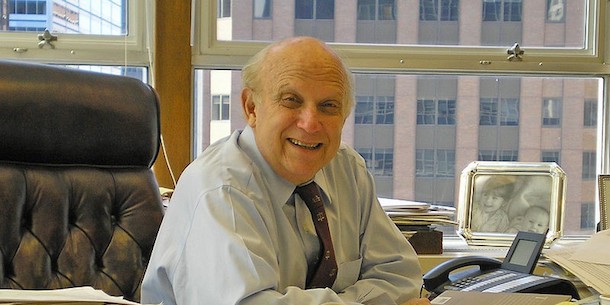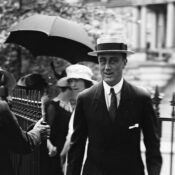Without free speech, there is no free society, says Floyd Abrams, a leading constitutional scholar and author of The Soul of the First Amendment. But anti-speech movements are insidious. “No one says, ‘I’m against free speech,’” says Abrams. “In history, totalitarian governments begin with enormous denunciations of the press.” And it’s only when the press has been publicly discredited and repudiated that “they really go after it and try to subjugate it.”
Abrams remembers well the incident that triggered his passionate involvement in protecting the 45 words in the First Amendment dedicated to freedom of expression. “I was a pretty young associate at my law firm, and the Nixon administration started to really crack down on the press. My firm represented NBC, and I got to do some of that work. I met reporters and I learned to understand the level of concern they had about being hauled into court to testify, the problems they had with gathering information if they couldn’t promise confidentiality to sources, and the risk they ran when they did. So I became more and more convinced that greater and greater First Amendment protections were needed.”
Jeanne Wolf: Cynics say we like to defend the ideas we agree with and oppose the ones we don’t like. You’ve written that it’s essential to defend even the words we hate.
Floyd Abrams: We don’t need the First Amendment to protect speech we agree with. The First Amendment basically says in America there is no wrong side, in terms of what is allowed to be said. That’s an overstatement, but that’s the broad First Amendment lesson: We will not let the government censor speech of any kind. If we didn’t have a First Amendment, we’d really be in a lot of trouble, bringing in the cops and shutting down publications. We remain, at this moment, the freest country in the history of the world in terms of free speech and a free press. However, the fact that the First Amendment protects speech here to a degree that would be unthinkable elsewhere does not mean that all speech is good or appropriate or should be complimented.
JW: Yes, some might say that free speech comes at the expense of fairness and civility.
FA: We have the ability to convey thoughts about anything at any time with very little in the way of sanctions. One of the downsides of that, and it comes with the territory, is that the internet has now become home for child pornographers, for Nazi sympathizers, for potential terrorists. Just as I defend freedom of expression, I would defend the right of the Facebooks of the world not to carry such material.
JW: There is also a spreading fear that a flood of unregulated information can be helpful to our enemies around the world.
FA: In national security, there is information which ought to be secret, and there are risks in certain information being made public. That said, we also live in a society in which overclassification has been the norm rather than the exception. It has been true in every administration — the amount of classified material dwarfs the number of real secrets. What happens is that WikiLeaks or Edward Snowden will come along and release thousands of pages of classified material. This can be harmful to our government, but, as critical as I’ve been of WikiLeaks, it could really be extremely dangerous to prosecute them. I very much hope that the administration does not proceed on that path, but I expect it will.
JW: What can ordinary citizens do to protect free speech?
FA: The most important thing is to use the First Amendment to speak out and to participate in the political process. Whether that’s handing out leaflets or making contributions or trying to persuade their friends. All of these things can be and should be the role of a citizen.
JW: Right now, it seems more frequent that we just indict people for one phrase they say on television or one overheard conversation — even a chance remark out of context. Are we overdoing that?
FA: People are more easily offended now by speech than any time that I can remember. You don’t have to be far off center to get some people angry. That would be okay if the people who were angry simply responded, but the problem is that the responses are often overdone. We hear cries of “Fire him!” Those kinds of responses are anti-speech and violate the spirit of the First Amendment.
JW: In your book, you called the First Amendment “the rock star of the American Constitution.” Why do you feel it’s that essential to our way of life and our country?
FA: I think free speech is the one element that makes us admired abroad and secure at home. Remember, one of the benefits of the First Amendment is that by not suppressing speech, you’re not forcing people to say things privately and in the dark. There’s a value in letting people have their say even if they’re wrong and offensive in what they say. I think that’s pretty well beaten into our fabric as a society in a way that generally serves us very well.
JW: When you watch the news (and I admit that I watch the news as if it’s a football game), how vocal are you and your wife when you see some of the outrageous things people say?
FA: Oh, I’d say that there are a lot of exclamations. I remember a month or two ago that there were crime statistics showing crime had decreased very significantly under President Obama, and President Trump was saying they had increased! The figures are the figures. It’s not a matter of opinion. Now and then, I’ve been heard to scream at the television screen.
—Jeanne Wolf is the Post’s West Coast editor.
An abridged version of this interview will appear in the July/August 2017 issue of the Post.
Become a Saturday Evening Post member and enjoy unlimited access. Subscribe now



